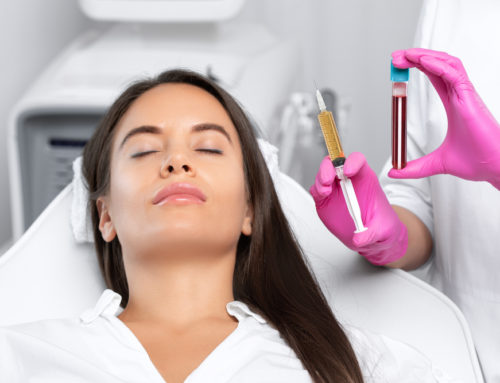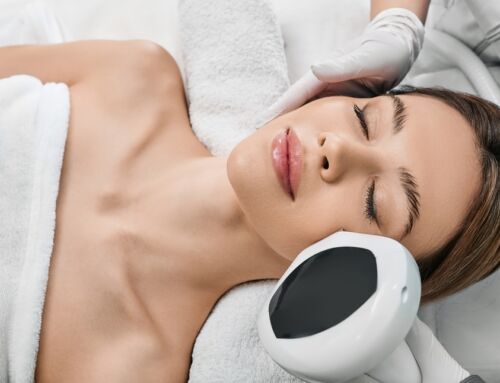What is Hyperhidrosis?
Hyperhidrosis, AKA excessive sweating, is a fairly uncommon medical condition associated with the nervous system that causes excessive sweating in one or more areas of the body. The sweating caused by hyperhidrosis occurs independently of environmental heat, body temperature, or exercise. However, heat and exercise can cause flare ups of hyperhidrosis.
People with this condition often produce four to five times more sweat than people who do not suffer from hyperhidrosis. As a result, people with this condition may also experience social anxiety, embarrassment, and even depression.
What Causes Hyperhidrosis?
The cause of hyperhidrosis symptoms depends on the type of symptoms you experience. Primary focal (essential) hyperhidrosis affects the sweat glands on the hands and feet in stressful situations. Occasionally, essential hyperhidrosis can also affect the sweat glands in the face.
Unfortunately, there is no known medical cause for primary hyperhidrosis, but there could be a genetic factor as the condition sometimes occurs in families.
What Are the Different Types of Hyperhidrosis?

Primary Hyperhidrosis
As mentioned above, this condition causes sweating on the hands, feet, and face. It also can cause severe underarm sweating (axillary hyperhidrosis), excessive groin sweating, and extreme sweating around or on the breasts.
Secondary Hyperhidrosis
When compared to primary hyperhidrosis, this condition is less common. This condition occurs when disease or another medical condition causes the sweat glands to overproduce sweat. The excessive sweating caused by secondary hyperhidrosis can be either localized to one area of the body, or involve general excessive sweating.
What Diseases Cause Secondary Hyperhidrosis?
The following conditions can change how your body’s neurological responses or hormonal responses. As a result, one or more of these conditions increase your chance of developing hyperhidrosis.
- Alcoholism
- Diabetes
- Gout
- Heart Disease
- Heart Failure
- Hyperthyroidism
- Hypoglycemia
- Lymphoma
- Menopause
- Obesity
- Parkinson’s Disease
- Pregnancy
- Rheumatoid Arthritis
What Else Triggers Excessive Sweating?

Hyperhidrosis is triggered by many factors such as, exercise, heat or cold, alcohol, coffee, tea, smoking, hot or spicy food, stress, anxiety, and strong emotions. Limiting these factors in your day to day life can help you manage your symptoms and reduce your risk for an episode of excessive sweating.
How to Diagnose Hyperhidrosis?
If you’re experiencing excessive sweating, first you will need to visit your doctor who will administer a few simple tests including blood tests, sweat tests, and/or urine tests.
In general, if you have experienced excessive sweating for at least six consecutive months in connection with one or more of the following symptoms, you most likely have primary hyperhidrosis.
- Bilateral sweating
- Relatively symmetrical sweating
- Your sweating Impairs daily activity
- One or more sweating episodes per week
- Your first sweating episodes starts before the age of 25
- Family history of hyperhidrosis
- Your sweating stops during sleep
If this is the case for you, you may be able to manage your symptoms with Botox injections in Nashville, TN.
TREATMENTS FOR hyperhidrosisexcessive sweating
Botox + Morpheus8 for Hyperhidrosis
Did you know hyperhidrosis can be treated with Morpheus8 or botox?
🔥 Morpheus8 can take 2-3 treatments for long-lasting or sometimes permanent results
🔥 Botox can last 6-8 months
Learn more about Morpheus8 treatments here.
BOTOX for hyperhidrosis in Nashville
In 2004, the FDA approved the use of Botox for hyperhidrosis. Since then, BOTOX® has proven to be an effective way to treat excessive sweating due to its nerve-inhibiting properties.
How does it work?
Using excessive underarm sweating as an example, a small volume of BOTOX® solution is injected through a very fine gauge needle into the affected area.
When a plastic surgeon or aesthetician offers Botox Cosmetic injections for forehead lines, crow’s feet, or other facial wrinkles, the Botox numbs the nerves in those areas. As a result, the facial muscles relax and stop pulling the skin as a patient communicates. This prevents the skin from wrinkling naturally, so no new fine lines or wrinkles appear.
The main ingredient of BOTOX is a neurotoxin created by the bacterium Clostridium botulinum, called botulinum toxin. In large amounts, this toxin is deadly, but in the tiny amounts used in Botox injections is perfectly safe.
How Botox Reduces Sweating
BOTOX® works by temporarily blocking the chemical signals from the nerves that stimulate the sweat glands. Once these glands stop receiving the overactive chemical signals, the excessive sweating stops. These injections can be administered anywhere around the body to help relieve hyperhidrosis symptoms.
The procedure only takes about 5-10 minutes, is relatively painless, and the effects of the treatment have been reported to last 6-9 months. Remember though that every patient responds differently to treatment.
Also, you should know that Botox injections are not permanent fixes to excessive sweating, as the neurotoxin will eventually wear off. Depending on the severity of the hyperhidrosis, multiple injections may be needed.
How Often Will I Need Botox Injections for Excessive Sweating?
You should see results within 1-2 weeks of the initial treatment. Our patients report a significant reduction in severe sweating after the first treatment.
However, there is a possibility that other nerves and sweat glands are the cause of your symptoms. If you notice another area developing or presenting excessive sweating, schedule a touch-up visit to address these areas.
After the first injection, your results should last for up to 3-6 months, but possibly up to 9 months. Your Nashville plastic surgeon will work with you and your doctor to devise a specialized treatment plan to help you maintain your results.
Do I Need to Make Special Preparations for Botox Injections?
Receiving injections for hyperhidrosis is a minor procedure and you don’t need to worry about coming into our office on an empty stomach, like with surgeries.
However, to achieve the best results, you should avoid alcohol and smoking for at least a week before your injections. You may also want to stop taking anti-inflammatory medications or blood thinners in order to prevent bruising. Just remember though that you should always ask your doctor first before you stop taking any medications.
After your treatment you should avoid rubbing or massaging the injection sites so the botilunum toxin doesn’t spread to another area of your body.
Visit Garza Plastic Surgery in Nashville for Hyperhidrosis Treatments + Aesthetics Services
If you think that Botox injections may help you manage your hyperhidrosis symptoms, schedule a consultation at Garza Plastic Surgery.
In addition to hyperhidrosis treatments, we also provide cosmetic Botox injections, lip fillers, liquid face lifts, and many other non-surgical aesthetic procedures.
Dr. Robert Garza, MD, FACS also provides breast surgery, breast augmentation, breast reconstruction, as well as body and face plastic surgeries. His partner, Tracey Robinson, APN, is an expert at all things skin care in Music City. Together in their practice they offer a one-stop-shop for Nashvillians who want to look and feel their best.





